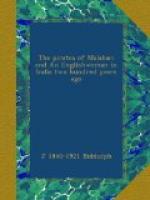He based his opposition to the bill on the unfitness of the Company’s officers to exercise authority, and to the bad relations sure to arise between them and the King’s officers.[7]
In quarters they were not allowed to give any orders to their men, or to have any control over them, the most trivial matters being kept in the hands of the merchants and factors. To such an extent was this carried, that for fifty years afterwards no military officer was allowed to give out the parole and countersign.[8] Their only duties were to command the men when under arms. Commissions were granted and taken away by the Council without reference to the Directors.
Under such treatment there could be neither self-respect nor pride in their profession. Of their general behaviour, we may gather some idea from an entry concerning Lieutenant Parker at this time. He was arraigned before the Council for drinking, brawling with his men, and frequenting base houses, for which the Council deprived him of his commission; but as he was ‘an extraordinary person in disciplining (drilling) soldiers,’ he was appointed adjutant of the regiment till he should give a specimen of improved behaviour. When there was fighting to be done, the command was taken by factors and writers, who were given temporary commissions as captains, colonels, etc. Midford, Brown, Cowan, and others we hear of in command of troops, were only soldiers for the occasion. So far back as 1676 the Directors had enjoined on their civil servants to acquire a knowledge of military discipline, that in the event of any sudden attack they might bear arms. Clive was far from being the first of the Company’s servants to lay down the pen for the sword, but he was the first to do so permanently.
The inferior quality of the Company’s officers through the first half of the century is reflected in the fact that among the many who distinguished themselves in the hard fighting that went on from 1751 to 1764, we find only two who had not graduated in the King’s service. These were Clive, who entered the Company’s service as a writer, and Preston, who was sent to India as a civil engineer. Of the Company’s purely military officers we hear little or nothing.
The men were worse than the officers. Instead of the sturdy agricultural labourers and farmers’ sons that filled the ranks of the King’s regiments, they were ‘the refuse of the vilest employments in London,’ as Orme described them fifty years later; ‘the worst of their kind,’ according to Clive. Of all nationalities, ages, and colours, badly armed, badly fed, and badly paid, they were almost without discipline. The native chiefs




